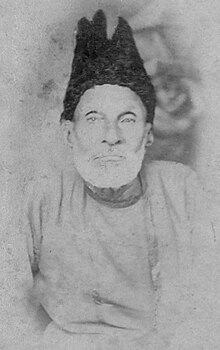
Back ميرزا غالب Arabic ميرزا جالب ARZ মিৰ্জা গালিব Assamese Mirza Ghalib AST Mirzə Əsədulla xan Qalib Azerbaijani غالب دهلوی AZB ग़ालिब Bihari মির্জা গালিব Bengali/Bangla মির্জা আসাদুল্লা খাঁ গালিব BPY Mirza Ghalib Breton
Mirza Ghalib | |
|---|---|
 Ghalib in 1868 | |
| Born | Mirza Asadullah Beg Khan 27 December 1797 Kala Mahal, Agra, Maratha Confederacy |
| Died | 15 February 1869 (aged 71) Ghalib ki Haveli, Delhi, British India |
| Resting place | Mazar-e-Mirza Ghalib Tomb, near Nizamuddin Dargah, Delhi |
| Pen name | Ghalib, Asad |
| Occupation |
|
| Language | Urdu, Persian |
| Period | Mughal era British era |
| Genre | |
| Subject | |
| Literary movement | Urdu movement |
| Years active | c. 1808–1869 |
| Notable work | Diwan-e-Ghalib |
| Spouse |
Umrao Begum (m. 1810) |
| Parents | Mirza Abdullah Baig (father) Izzat-ut-Nisa Begum (mother) |
| Urdu literature ادبیاتِ اُردُو | |
|---|---|
| Urdu literature | |
| By category Urdu language Rekhta | |
| Major figures | |
| Amir Khusrau (father of Urdu literature) - Wali Dakhani (father of Urdu poetry) - Mir Taqi Mir - Ghalib - Abdul Haq (Baba-e-Urdu) - Muhammad Iqbal | |
| Urdu writers | |
| Writers – Novelists – Poets | |
| Forms | |
| Ghazal - Dastangoi - Nazm – Fiction | |
| Institutions | |
| Anjuman-i Taraqqi-i Urdu Urdu movement Literary Prizes | |
| Related Portals Literature Portal Pakistan Portal | |
Mirza Asadullah Beg Khan (1797–1869), also known as Mirza Ghalib,[1] was an Indian poet.[2] He was popularly known by the pen names Ghalib and Asad. His honorific was Dabir-ul-Mulk, Najm-ud-Daula. During his lifetime, the already declining Mughal Empire was eclipsed and displaced by the British East India Company rule and finally deposed following the defeat of the Indian Rebellion of 1857; these are described through his work.[3]
He wrote in both Urdu and Persian. Although his Persian Divan (body of work) is at least five times longer than his Urdu Divan, his fame rests on his poetry in Urdu. Today, Ghalib remains popular not only in the Indian subcontinent but also among the Hindustani diaspora around the world.[4]
- ^ Pavan K. Varma (1989). Ghalib, The Man, The Times. New Delhi: Penguin Books. p. 86. ISBN 0-14-011664-8.
- ^ "Mīrzā Asadullāh Khān Ghālib". Britannica. Retrieved 16 August 2020.
- ^ Nicole Dastur (12 May 2007). "Remembering 1857 in 2007". The Times of India.
- ^ Ras H. Siddiqui (27 July 2003). "Ghalib in California". Dawn. Archived from the original on 4 February 2009. Retrieved 20 May 2013.
